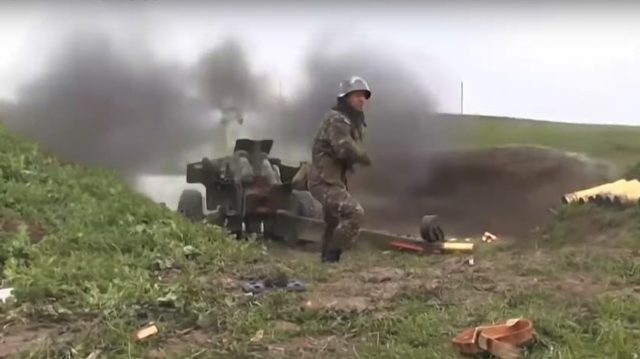Armenia says the country is ready to discuss a cease-fire in the separatist region of Nagorno-Karabakh
Armenia ready to discuss cease-fire amid Azerbaijan clashesBy AVET DEMOURIANAssociated PressThe Associated PressYEREVAN, Armenia
YEREVAN, Armenia (AP) — Armenia said Friday it is ready to discuss a cease-fire in the separatist region of Nagorno-Karabakh, where heavy fighting between Armenian and Azerbaijani forces this week has killed dozens and left scores wounded.
The fighting is the biggest escalation in years in the decades-long dispute over the region, which lies within Azerbaijan but is controlled by local ethnic Armenian forces backed by Armenia. Cease-fire calls have come from around the globe.
On Thursday, leaders of Russia, France and the United States — co-chairs of the so-called Minsk Group, which was set up by the Organization for Security and Cooperation in Europe in 1992 to resolve the conflict — issued a joint statement calling for an immediate cease-fire and “resuming substantive negotiations … under the auspices of the OSCE Minsk Group co-chairs.”
Armenia’s Foreign Ministry said the country stands “ready to engage” with the co-chairs of the group “to reestablish a cease-fire regime based on the 1994-1995 agreements.”
“Armenia remains committed to the peaceful resolution of the Nagorno-Karabakh conflict,” the statement read.
Azerbaijan’s president says Armenia’s withdrawal from Nagorno-Karabakh is the sole condition to end the fighting. Armenian officials allege Turkey is involved in the conflict and sending fighters from Syria to the region. Ankara has denied that while publicly siding with Azerbaijan in the dispute.
The Azerbaijani Foreign Ministry said late Friday “the Minsk Group, in its many statements, underlined the unacceptability of the status quo. However, acting regardless of this, Armenia aims to strengthen the status quo regime based on occupation. … All responsibility for the current situation lies on the military-political leadership of Armenia.”
U.N. Secretary-General Antonio Guterres “deeply regrets that parties continue military engagement despite strong and repeated calls of the international community,” spokesman Stephane Dujarric said.
The Armenian Foreign Ministry also condemned “aggressive joint actions of Azerbaijan and Turkey” and said that “this aggression against Nagorno-Karabakh will continue to receive our strong and resolute response.”
Armenian military officials reported that Azerbaijan carried out strikes on Nagorno-Karabakh’s capital of Stepanakert.
Azerbaijan’s Defense Ministry accused Armenian forces of shelling Agdam, Terter and Barda regions and attacking other areas.
Both sides reported destroying military equipment belonging to their adversary.
Nagorno-Karabakh officials said more than 150 servicemen on their side have been killed so far. Azerbaijani authorities haven’t given details on its military casualties but said 19 civilians have been killed and 55 more have been wounded.
Several journalists were wounded in shelling of the town of Martuni on Thursday. Two were French citizens working with Le Monde newspaper.
Reporter Allan Kaval and photographer Rafael Yaghobzadeh were taken to the Stepanakert hospital and operated on there, and were being evacuated Friday to Yerevan. The two were to be taken to Paris, Le Monde reported.
In an article published Friday, Le Monde said they had traveled to Martuni on Thursday to “see for themselves the extent of the damage” from this week’s fighting. They were with several French, Armenian and other journalists when the town was attacked.
The report quotes regional human rights ombudsman Artak Beglaryan as saying four civilians were killed and 11 other people were wounded in the shelling.
Armenia and Azerbaijan have been locked for decades in a conflict over Nagorno-Karabakh, the site of a separatist war fought in the early 1990s and ending in 1994 — three years after the breakup of the Soviet Union. The 4,400-square-kilometer (1,700-square-mile) enclave in the Caucasus Mountains, roughly the size of the U.S. state of Delaware, lies 50 kilometers (30 miles) from the Armenian border.
Turkey has said it would provide assistance to Azerbaijan if requested, but denied sending in foreign mercenaries or weapons.
On Friday, Russian President Vladimir Putin spoke with Pashinyan by phone for the third time this week, and both “expressed serious concern” about reports that fighters from the Middle East were involved in the conflict.
“Vladimir Putin once again emphasized the necessity of immediate cessation of hostilities and resumption of politico-diplomatic efforts to resolve the conflict, in line with the statement by presidents of countries that co-chair the OSCE Minsk Group,” the Kremlin’s readout of the call said.
Turkish Foreign Minister Mevlut Cavusoglu said Friday a cease-fire would be conditional on Armenia’s withdrawal from the separatist region.
“As the Azerbaijani president has said, Armenia must withdraw from these territories in order for Azerbaijan to declare a cease-fire,” Cavusoglu said at a news conference with his Italian counterpart in Rome. “This is an absolute legitimate call.”
He also called for international pressure on Armenia to withdraw.
“If the international community wants to do something, it should (ensure) that Armenia withdraws immediately,” he said.
Cavusoglu reiterated that Azerbaijan had not requested military assistance but that Turkey was ready to provide it if needed.
Turkey’s President Recep Tayyip Erdogan called Azerbaijan a “brotherly state” on Friday and said its offensive in the separatist region aimed “to defend its own lands and to liberate Nagorno-Karabakh, which is under occupation.”
“With all our capability and all our heart, we will continue to be by Azerbaijan’s side,” Erdogan said, speaking at the opening of a hospital in the town of Konya in central Turkey. “God willing, this struggle will continue until Nagorno-Karbakh is saved from occupation.”
—-
Associated Press writers Aida Sultanova in Baku, Azerbaijan, Daria Litvinova in Moscow, Angela Charlton in Paris and Suzan Fraser in Ankara contributed.

COMMENTS
Please let us know if you're having issues with commenting.